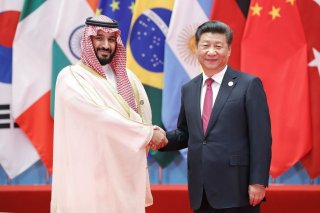Has China Shifted the Middle East Balance of Power?
The Iranian-Saudi deal brokered by China is a test of Washington’s power and skill. It is a challenge the United States cannot afford to fail.
Earlier this month, Iran and Saudi Arabia agreed to restore diplomatic ties after seven years and signed a China-brokered agreement in what is being termed a breakthrough deal for the region. How does this impact and alter America’s geopolitical stature in the region? What are the first and second-tier consequences of weakening the U.S. presence and position in the Gulf in favor of Washington’s main geopolitical rival?
While some see the Saudi-Iranian rapprochement as a striking diplomatic success for China, others claim it is nothing more than Beijing attempting to insert itself into a strategic region and play peacemaker. After all, the failure of China’s “Going Out” campaign, aimed at increasing foreign investments and infrastructure development abroad, caused multi-billion-dollar losses. Beijing’s Wolf Warrior Diplomacy, where officials exhibited aggressive and insulting behavior, backfired. However, the newly-reached détente between the Middle East’s leading Sunni and Shia rivals improves China’s ability to leverage energy ties in the region, while great power rivalry in the Gulf may heighten tensions there.
The United States has found it difficult to help its allies neutralize the Iranian nuclear program and multipronged Iranian extremist and imperialist stratagems, which include supporting the Houthi rebels in Yemen, Shia militias in Iraq, and Hezbollah in Lebanon. Simultaneously, the United States allowed its relationship with long-time ally Saudi Arabia to go from bad to worse. All the while, China was expanding its influence in the Middle East. Thus, a power realignment in the energy-rich region was unfolding while America slept. It’s time to wake up.
The latest Saudi-Iranian development did not come out of nowhere. China has developed robust political and economic relationships with the Middle East through increasing trade and investment in the region. By maintaining a steady cash flow, Beijing has transformed economic partnerships into political ones. As the British used to say: “soldiers followed traders.”
There are several strategic vehicles the Chinese use: The Shanghai Cooperation Organization was expanded to several Middle Eastern countries, such as Iran and Turkey, as “dialogue partners.” This calculated growth did not come overnight; it demonstrates the deliberate pace of Beijing’s growing influence.
Chinese president Xi Jinping’s flagship venture, the Belt and Road initiative (BRI) is aimed at gaining access to natural resources in the Middle East and beyond. Recent contracts under the BRI include three ports, two in Israel and one in the United Arab Emirates; thousands of miles of railroads and highways; twelve 5G contracts; a drone factory; and even an expansion project on the Suez Canal valued at $8.5 billion, with China investing close to $5 billion in the canal’s economic zone. The cumulative Chinese investment in the Gulf is $137.27 billion, while it reached $213.9 billion in the broader Middle East between 2005 and 2021.
China is also the biggest customer for both Saudi Arabian and Iranian oil, which explains Beijing’s interest in moving forward with a settlement between the two and their place among the top beneficiaries of the BRI. The Chinese have agreed to a $400 billion investment over the next twenty-five years in Iran’s banking, telecommunications, ports, railways, healthcare, and information technology sectors in exchange for a heavily discounted supply of Iranian oil.
Even leaders who might be amicable to the West won’t push back on China’s creeping influence in regional matters given the economic benefits their countries can gain through ties with Beijing. The United States needs to come to grips with the depth of China’s financial reach and strategize to counter Beijing’s clear political intent.
The United States is also heavily invested in the Middle East, not just for economic interests, but for regional security—which directly affects its own national security. These investments are too important to jeopardize by ignoring China’s calculated attempts at undermining America’s role.
The next logical step for the United States is to push for Iran’s full compliance with the Additional Protocol of the Non-Proliferation Treaty, giving up all its highly enriched uranium, and allowing International Atomic Energy Agency inspectors full access to its nuclear facilities. The United States should also enhance its military cooperation with the Gulf states as the Iranian threat will not wane.
The influence of oil and gas trade on the region’s politics is too big to ignore. Energy markets are significant to geopolitical relationships—even if some U.S. stakeholders prefer a foreign policy independent of the hydrocarbon economy. Finally, it is also important to engage with the Gulf nations in their efforts to diversify their economies, where the United States has much to offer in high technologies, internet technologies, health, education, and other industries.
As Xi visits Moscow pretending to broker peace between Russia and Ukraine, checking China’s influence in strategic areas of the world, including Europe, the Middle East, and Africa, is becoming vital for U.S. national security. Competition with China in science, technology, business, diplomacy, and global security has become the defining theme of the twenty-first century. The Iranian-Saudi deal brokered by China is a test of Washington’s power and skill. It is a challenge the United States cannot afford to fail.
Ariel Cohen, Ph.D., is Director of the Energy, Growth, and Security Program at the International Tax and Investment Center and a non-resident Senior Fellow at the Atlantic Council. He is the founder of International Market Analysis Inc www.IMAStrategy.com
Image: Salma Bashir Motiwala / Shutterstock.com

